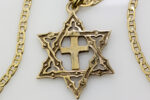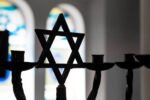“I’ve always read that Jews don’t believe in the concept of hell. Is that true?”
First, let me distinguish between what “Jews” believe versus what “Judaism” believes. Quite often one has nothing to do with the other and this is a perfect example. Jews may not believe in the afterlife—heaven and hell—but Judaism unequivocally does.
Growing up I was told that Jews don’t believe in the afterlife. No heaven. No hell. No nothing. However, like most everything else I learned about Judaism growing up, this was incomplete. Although there are strains of modern Judaism that would argue against life after death, the vast majority of Judaism, Jewish history, Jewish theology and Jews themselves unequivocally believe in olam habah—the world to come.
Yes, there is heaven. Although the Hebrew Bible devotes little time to speculating upon it, the Jewish tradition is replete with varying efforts and depictions of what the “world to come” might be. Some notions imagine God as Avenu Malkenu (Our Father and King) sitting in judgment, delivering reward or punishment within the heavenly court. Others imagine a supernal beit midrash (house of study), where the tzaddikim (righteous) study Torah all “day” long. The more mystical Jewish traditions envision a ladder of consciousness, at the very top of which resides the ineffable: God beyond description. As you descend down the ladder, distinction sets in with arch-angels, angels, spirits and other divine beings all the way down to this world, where souls are coming and going, entering this world and leaving this world (and even a Jewish notion of reincarnation—returning to this world once again).
Yes, Judaism believes in “heaven,” and yes, Judaism also believes in “hell.”
Again, there is no one depiction of the world on high, so too “the world below” is equally nuanced, sophisticated and diverse in description. The Torah refers to a place called “Sheol,” originally a physical location and later a spiritual destination for sinners and troubled souls. Some, particularly the Kabbalists, viewed Sheol as a necessary stopping point for all souls on their journey from this world to the next, a place to work through the sins of this life. Later, the Jewish mystical tradition expanded upon this notion, describing an even more complex version called “Gehinom.” Whereas some souls ascend straight to the Garden of Eden on high, the vast majority of souls have some length of a layover, most less than 12 months, at airport Gehinom—a place to work through life’s hangovers as they prepare for olam habah. The truly evil, however, are either eternally damned to Gehinom or disposed of into the cosmic evil trash heap. Thankfully, according to this view, for most of us it’s just a matter of time before we’re on the next flight out (or up), en route to, yes, heaven.
The bottom line: There isn’t one definitive understanding of life after death or heaven and hell. As the saying goes, “Two Jews, three opinions.” So, believe what you want, because ultimately Judaism doesn’t care what you believe, but rather what you do. (That, however, is an ask-a-rabbi question for another time.)
Hear more about heaven and hell in Judaism from Rabbi HaLevi in an episode of The Vibe of the Tribe podcast below!














